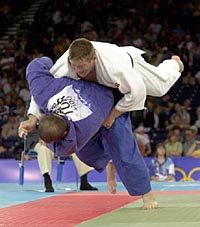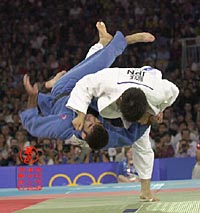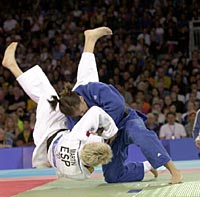By Neil Ohlenkamp
Looking at the results for gold medallists and comparing them to previous world championships and Olympics we can determine the trends in which countries are most successful. This may have implications about the relative merits of training and coaching methods that are used in different countries. Judo World Championships started in 1956, and Judo was first in the Olympic Games in 1964. Since 1956 no country has earned more gold medals than Japan. Japan has now earned 120 gold medals (including 32 Olympic gold medals) compared to their closest rival, France, with 39 (including 10 Olympic gold medals). The gap is growing wider each year. The following chart shows the top gold medal producing countries in either the Olympics or World Championships since 1956.
Olympic gold medals are often more sought after than World Championship gold medals. Since Judo was admitted into the Olympic Games in 1964 the results for the top three countries earning gold medals in Olympic competition have been similar to the overall results shown above. OLYMPIC GOLD MEDALS In the 1980's and early 1990's Japan's dominance was in question. This was in large part because Japan was slow to produce successful female competitors. In the first seven World Championships where women competed (from 1980 through 1991) Japan only earned one gold medal. In women's competition of the 1993, 1995 and 1997 World Championships (as well as the 1996 Olympics), Japan earned one gold medal per event. Since then there has been a dramatic change. In the next three world championships (1999 through 2003) Japanese women earned ten gold medals. In Athens, Japanese women earned 5 of the 8 gold medals contributing significantly to its overall dominance in the world. To determine what country is doing the best in international competition recently, we can look at the results during the last five years, a period when we had three different world championships plus the 2000 and 2004 Olympics. Japan has earned 30 gold medals during this period. Recently Cuba has been the second best country in producing gold medals (all but one were women). China (six women's gold medals) and France (three male and two female) follow closely behind. The following countries were the only ones to earn more than one gold medal during this period. GOLD MEDALS 1999-2004 In modern Olympic Games competition (since 1988 when women's competition was added) Japan is clearly re-establishing its dominance. The following chart shows the increasing number of gold medals earned by Japan in the Olympics, and the decreasing number of gold medals earned by other countries.
Although not as dramatic, a similar change can be seen in World Championship results. Japan earned as many gold medals in the last three championships as in all the previous five. As Japan's success increased, the ability of many other countries to earn gold medals generally decreased.
This trend continues to be a matter of concern for international Judo now that Japan is again winning the majority of the gold medals. The 57% success rate in the 2004 Olympics is far less than the first two World Champioinships when Japan won 100% of the gold medals, or the first Judo event in the Olympic Games when Japan won 75% of the gold medals, but Japan's lead is growing rapidly. In spite of Japan's recent success, Judo has become a truly international competition sport and Japan will never be able to achieve the level of dominance that it had in the very early years. During the period from the first World Championships in 1956 through 1979 Japan won an astounding 72% of the world and Olympic gold medals. This changed dramatically during the 1980's, and even the recent increase in Japanese gold medals does not change the fact that any country can win a gold medal in Judo. Twenty three countries have now earned Olympic gold medals in Judo, and many more have won world championships. In the 2004 Olympics Greece and Belarus won their first Olympic gold medals in Judo, and in the most recent World Championships Argentina won its first gold medal. It is clear that the Olympic medal winners in Judo represent countries in all parts of the world. It is also clear that Japan continues to raise the level of Judo competition. Other countries now have to step up to meet the challenge.
NOTE: This article is an update of another article written after the 2003 World Championships. The 2003 analysis and data is here. | |||||||||||||||||||||||||||||||||||||||||||||||||||||||||||||||||||||||||||||||||

 Now that we have the results of the 2004 Athens Olympic Games, it is time to update the 2003 analysis of trends developing in modern championship Judo. Judo is one of the most widespread sports in the world. High level Judo competition is very international and champions come from all parts of the world. In the 2004 Olympics there were 15 countries represented in the 14 matches of the finals to determine the gold and silver medallists, compared to the 2003 World Championships where there were 15 countries represented in the 16 final matches. Many countries came close to winning gold medals, but unlike the previous world championships Japan earned the majority of the gold medals (the first time since 1976 that any country has earned the majority of gold medals). There were seven different countries that earned gold medals in the 2004 Olympics, but Japan displayed their growing dominance by winning 8 gold medals, two more than in the World Championships held the year before.
Now that we have the results of the 2004 Athens Olympic Games, it is time to update the 2003 analysis of trends developing in modern championship Judo. Judo is one of the most widespread sports in the world. High level Judo competition is very international and champions come from all parts of the world. In the 2004 Olympics there were 15 countries represented in the 14 matches of the finals to determine the gold and silver medallists, compared to the 2003 World Championships where there were 15 countries represented in the 16 final matches. Many countries came close to winning gold medals, but unlike the previous world championships Japan earned the majority of the gold medals (the first time since 1976 that any country has earned the majority of gold medals). There were seven different countries that earned gold medals in the 2004 Olympics, but Japan displayed their growing dominance by winning 8 gold medals, two more than in the World Championships held the year before. 120
120 The dramatic results from the Athens Olympic Games adds to the conclusion from the 2003 Osaka World Championships that Japan is clearly the dominant powerhouse of Judo champions, and that fewer and fewer countries can compete successfully.
The dramatic results from the Athens Olympic Games adds to the conclusion from the 2003 Osaka World Championships that Japan is clearly the dominant powerhouse of Judo champions, and that fewer and fewer countries can compete successfully.